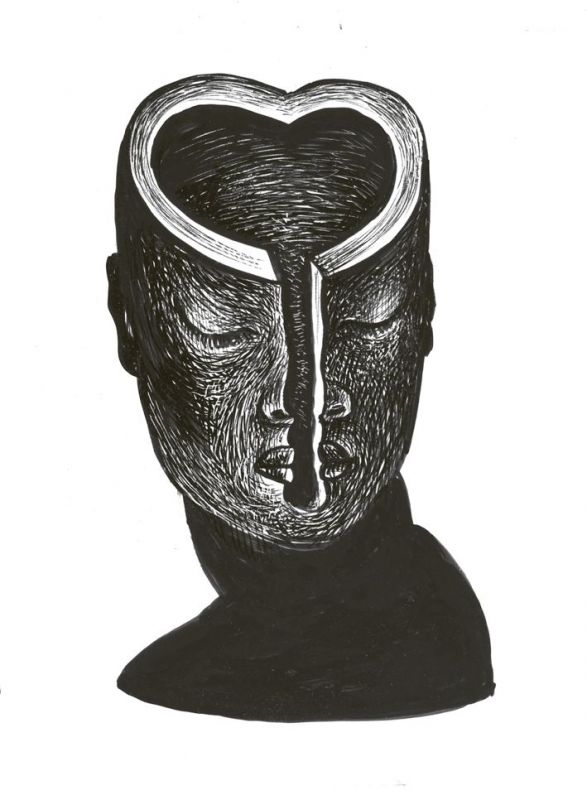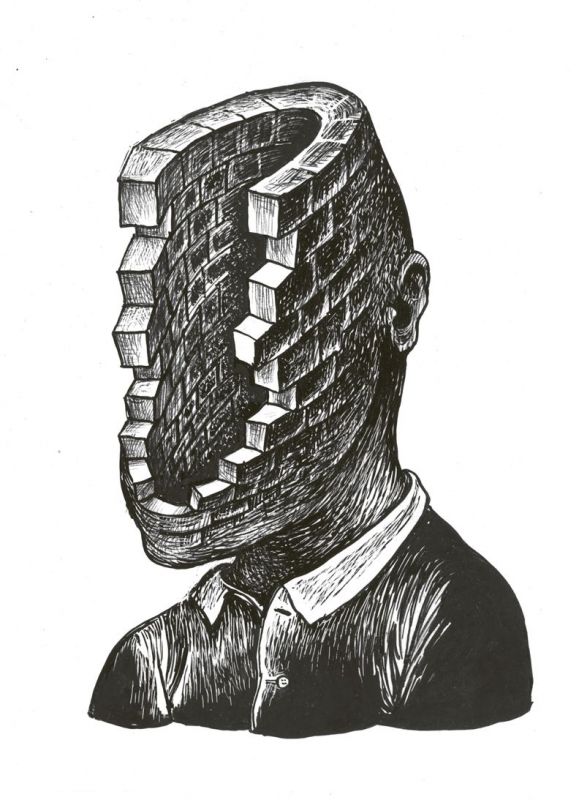József Szurcsik : Behind the Window

József Szurcsik: Drawing from the Bestiarium humanum series
2017–2018, ink on paper

József Szurcsik: Drawing from the Bestiarium humanum series
2017–2018, ink on paper
The room is more than just a location.
The room encapsulates a multitude of meanings.
The room as the symbol of a welcoming home, a living space, therefore, is more than just a built environment.
The room as a safe space, somewhere to rest, a place for tranquillity, regeneration, contemplation, togetherness, dreams, an artistic environment, a base for creativity, the studio.
The room as a music room, library, study, home movie theatre or a venue of festivities.
A room for incarceration, imprisonment, confinement, incarceration, being locked away: the room as a prison.
The room as an arena for debates serious and frivolous, for jealousy, for envy, for infidelity, for divorce, for the first night and the last. The room for sleeping until morning, for good and bad dreams, for insomnia, for the sober and the drunk, for the hungover, for depression, for violence, for burnout, for gratuitous self-reproach, for feelings of inferiority, for narcissism.
The room is the room of the soul, of the consciousness, of the spirit, of the emotions, of happiness, of dignity, of the universe.
The room is for the arriving and the departing.
The room, as a room of tears, of hiding, of withdrawal, of suffering, of illness, of recuperation, of destruction, of mourning, of survival, of pain, of healing and recovery, of a new start, of rebirth, of youth, of old age, of love, of babies, of children, of the family, of laughter and of passing once again.
The room is a room of time, of infinity.
The room of solitude, of opposites, of loneliness, of infinite boredom, of anger, of hate, of ugliness, of madness.
A room of joy, of productive coexistence, of carefree companionship, of friendship, of tolerance, of love, of curiosity, of attentive interest, of tenderness, of beauty, of miracles.
Your room, yours alone, enclosed by the walls of self-knowledge, where you are you, where times passes differently, where your desires struggle – with you, because this is your room: where the decisions, resolutions, honesty and truths live together with you, where objects stretch back into your past and other people’s. Your room, where memories and photographs hang on the wall and hang about casually propped at an angle on their frames atop a chest of drawers; this is how every little object rests in your room, where everything really is yours, and of course nothing is.
The room is a concept.
The room is a symbol of the material world.
The room is a sentry post for souls.
A human storehouse, a waiting room, a home for confessions, for ever-repeated crimes and atonement.
A room where there is desertedness, loneliness and fulfilment, poor and rich, truth and lies, personal effects, your own stuff and that of others, legal and illegal drugs, hidden treasure, secrets – bad and good – billions of desires, desires of billions, trust and faith, theism and atheism.
The room of saints, of angels, of demons, spirits and ghosts.
The room is for science, for thrills, for naked reality, for esoterica, for magic.
The room of light and of darkness.
The room belongs to the furniture – witnesses of times gone by, companions of the present, servants of the future: The room is of the future, the past and the present.
The room, as part of a building, a designed space and form, a composed geometric, static ensemble of shapes and materials, the home of rational but f ragile realities.
A room of the most diverse tastes.
The room as the home of chaos and order.
The noiseless room of infinite silence, of screaming, of shouting.
The room of intangible abstraction, of constantly changing imagination.
The room of slimming, of obesity, of running on the spot, of imagined sit-ups and neglected push-ups.
A room in which nobody lives any more, or in which nobody has ever lived, or somebody lives in it somehow, but without really inhabiting it, where there’s nothing on the wall, where a dead star hanging awkwardly – snagged on a wire, a burned-out lightbulb pointing downwards – mournfully reflects the immeasurably warped, immobile, great big nothing.
A room with pictures on the wall, internet whizzing through a computer, a refrigerator humming in a corner somewhere on the other side of the wall, the aroma of coffee wafting in from outside or the smell of food rolling in greasily, a toaster languishing over there, watched by the unwashed dishes.
Here inside, a vase stuffed with some kind of flowers loiters sadly on the table, beneath it spreads out a rug with tassels and without them, waves of curtains hang, freshly washed, a small cushion and perhaps a little dog, a little cat, lounges around, or it could be large for all I know, or a crumpled pullover, the murmuring washing machine rocks on the tiles out there, a ball of fluff hides in here, a dusty mirror peeks out through the window, a fly rests on the lampshade, an old red wine stain graces the upholstery of an armchair and the exit is at the entrance – a handful of keys dangles from the lock.
Rooms.
Rooms of freedom, of games, of personal play space, of the freedom to play – Artonomy.
13 July 2020